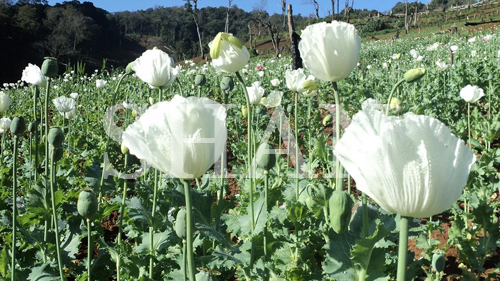From all over Shan State, reports have begun to arrive that poppy cultivation is back, as early as August in the south and east, but only recently in the north.

While authorities have warned that poppies must be grown “at the nape” (out of sight) and “not on the forehead” (within sight), many fields are still visible from the motor roads, as in Hopan-Hokhieng area, south of the Mongpan-Mongton road, according to new arrivals of migrants in Chiangmai.
“All known producers like Loi Khilek (Mongton township), Loilai (Mongpan township), Kungmao and Pangtawi (Langkher township) and Sanien (Loilem township) are reported,” said a researcher who doubles as an aid worker on the Thai-Burma border.
Reports from the north are also similar, except in a few townships like Namtu and Mantong where fighting between the Burma Army and the United Nationalities Federal Council (UNFC) alliance is taking place. “The pawliangs (financiers) are offering a daily wage of K 3,000 ($ 3) plus 3 meals a day,” said a businessman from Lashio who often visits Namtu. “But many people say a lot of risks are involved, such as being caught in the crossfire and being forced to serve as porters.”
Areas in Lashio township, such as Manmark, Mong Kiet and Mong Yaw that are under the control of the Burma Army run Manpang PMF (People’s Militia Force) that had declared drug-free in 2006 has also “returned to its old ways.” These areas were once under the protection of the late Khun Sa (1934-2007) and at present under Bo Mon, a former Khun Sa lieutenant.
In the south, where the Shan State Army (SSA) South that has signed an agreement with Naypyitaw for cooperation against drugs, farmers concerned about possible retaliations from the SSA were reportedly told by PMF officers in Laikha, in August: “It is not the Burma Army and us who are against poppy cultivation. It is Yawdserk (SSA leader). Join us and you’ll be protected.”
The SSA meanwhile said development of people’s livelihood must come before suppression.
Lt-Gen Ko Ko, military appointed home minister and chairman of the Central Committee for Drug Abuse Control (CCDAC) announced on 5 October its 15 year masterplan to eliminate drugs by 2014 has been extended 5 years to 2019.


